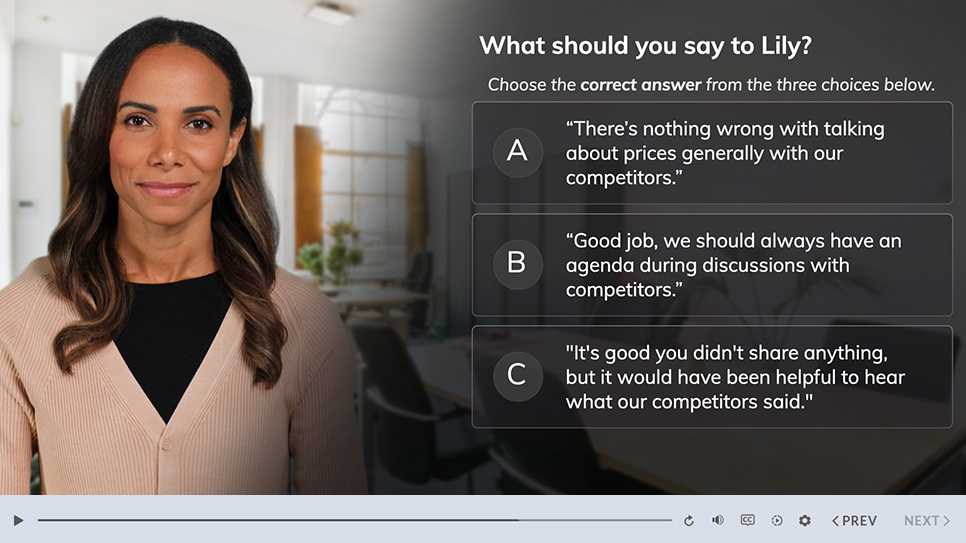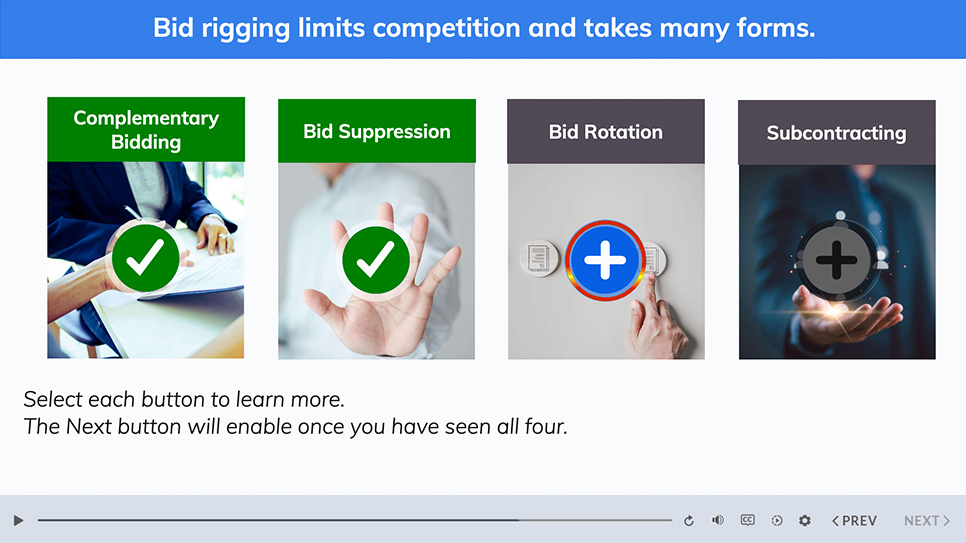
Antitrust and Competition Law Training
Ensure your employees can recognize and report concerns of anticompetitive actions that can lead to costly fines and penalties.
Course description
Traliant’s Antitrust and Competition Law training is a 30-minute interactive course that equips employees with a solid understanding of key antitrust laws and prohibited practices. Through engaging scenarios, employees will learn to recognize and avoid questionable or illegal business practices and respond appropriately if they encounter them.
ONLINE TRAINING
Antitrust and Competition Law Training

This course covers these topics and more:
- Overview of antitrust laws
- Monopolies
- Avoiding violations including bid rigging, no-poaching agreements, wage fixing and price fixing
- Prohibited practices
- Trade associations
- Supply chain vertical relationships
- Supply chain manufacturer requirements
- Penalties and punishments
THE TRALIANT DIFFERENCE
Compliance you can trust.
Training you will love.

Legal expertise
Our in-house legal team monitors the latest laws, rules and regulations, so you don't have to. You can rest assured that our courses are continuously compliant.

Brilliant training
With cinematic-quality videos produced by our Hollywood-based team, your employees will love our customizable, interactive, story-based training.

Valued partnership
Our main focus? It’s all about making your job easier. We do that with unmatched responsiveness and seamless deployment, dedicated to driving your success.

Meaningful impact
We don’t just deliver brilliant training, we help you create meaningful impact by broadening your employees' perspectives, achieving compliance and elevating culture.
KEY FEATURES
Why you'll love our training
It’s time to embrace a new era of online training with a valued partner who will ensure seamless implementation to fit your exact, a truly enjoyable learning experience and courses with continuous compliance you can trust.
Compliance expertise
Traliant's in-hour legal expertise ensures training is accurate and kept up-to-date with any regulatory changes.
Accessible to users with disabilities
Traliant provides an inclusive experience for all users, including those with disabilities, by going beyond Section 508-C standards and offering WCAG 2.1 AA.
Story-based learning
Our story-based approach blends leading instructional design with Hollywood talent to produce engaging, interactive and nuanced training.
Course administration
Traliant makes it simple to roll out training to your workplace and provide technical support directly to your employees at no additional cost.
Course customizations
Tailor courses to include your logo, relevant policies, workplace images, and more. Traliant can even customize the course with scenarios that take place in your own workplace environment.
Translations
Training is available in English, Spanish and is supported in over 100 languages.
COMPLIANCE EXPERTISE
Your partner in training compliance

Uniquely qualified in-house compliance team
Our exceptional in-house Compliance Advisory Team is led by Michael Johnson, Chief Strategy Officer and former U.S. Department of Justice attorney who has provided training and guidance to organizations like the Equal Employment Opportunity Commission, Google, the United Nations, and the World Bank.

Keeping you compliant, effortlessly
Keeping up with the complex web of employment laws — especially if your workforce spans multiple states — can be tricky. That’s why we offer a streamlined training solution that ensures you stay compliant with federal, state, and local regulations, so you can focus on what matters most: your team.

Simplifying your policies and handbooks
Crafting an employee handbook that meets legal standards can be daunting. Let us ease the burden. We help you navigate regulatory changes to ensure your policies and handbooks not only comply with the law but also reflect industry best practices.
What to consider when choosing the most effective antitrust training

- Minimize legal and financial risks: Antitrust violations can result in significant fines and penalties for both companies and individuals. Training helps organizations to comply with antitrust laws and to protect themselves from these risks.
- Maintain a positive reputation: Antitrust violations can damage a company's reputation and erode trust with customers, partners, and investors. Training helps to create a culture of compliance and to protect the company's image.
- Promote a strong ethical culture: Training helps to ensure that employees understand the importance of fair competition and that they are committed to conducting business ethically.
- Empower employees: Training provides employees with the knowledge they need to understand antitrust laws and to make informed decisions about their business activities.
- Strengthen your organization's compliance program: A robust antitrust training program is an essential component of a strong compliance program, helping to mitigate legal and reputational risks.
- Promote a culture of compliance: Training helps to create a culture where employees understand that compliance with antitrust laws is essential and that they are expected to report any potential violations.
- The Sherman Act (1890): This law prohibits monopolies and other anticompetitive practices, such as price fixing, bid rigging, and market allocation agreements.
- The Clayton Act (1914): This law prohibits mergers that are likely to substantially lessen competition.
- The Federal Trade Commission Act (1914): This law created the Federal Trade Commission (FTC), which enforces antitrust laws and investigates anticompetitive business practices.
- The Robinson-Patman Act (1936): This law prohibits price discrimination, which is charging different prices to different buyers for the same product or service.
- Higher prices: Without competition, a monopolist can set higher prices, which can harm consumers.
- Reduced quality: A monopolist may have less incentive to innovate or to improve the quality of its products or services.
- Limited choice: Consumers may have fewer choices if there is only one company providing a particular product or service.
- Price fixing: Companies agree to set prices at a certain level, instead of competing on price.
- Bid rigging: Companies collude to manipulate bidding processes, ensuring that a particular company wins a contract.
- Market allocation: Companies agree to divide up a market among themselves, avoiding competition in certain areas.
- No-poaching agreements: Companies agree not to hire each other's employees, limiting competition for talent.
- Criminal penalties: Individuals can face fines and imprisonment.
- Civil penalties: Companies can face fines, and individuals can face civil penalties.
- Injunctions: Courts can issue injunctions that require companies to stop engaging in illegal behavior.








